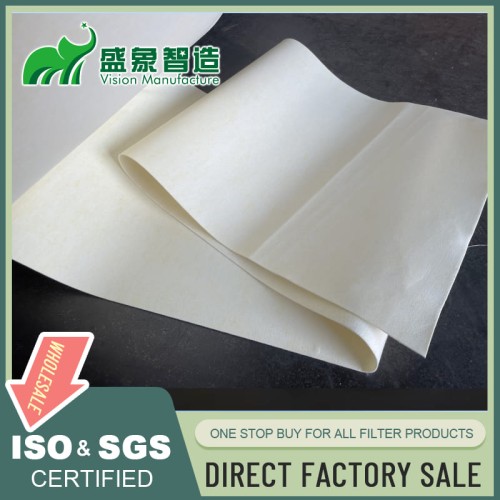
Non-Woven Polyester Fabric: Versatile Solutions for Advanced Filtration and Industrial Applications
I. Introduction
Non-woven fabrics have revolutionized the textile industry with their versatility and efficiency, particularly in the realm of filtration and industrial applications. Among these innovative materials, non-woven polyester stands out due to its robust performance and adaptability. This introduction explores the rise of polyester in non-woven technology and its critical role in enhancing industrial processes and filtration systems.
II. Understanding Non-Woven Polyester Fabric
Non-woven polyester fabric is a sheet or web structure bonded together by entangling fiber or filaments mechanically, thermally, or chemically. They are flat, porous sheets made directly from separate fibers or from molten plastic or plastic film. Notably used in various applications, non-woven polyester is produced through several processes:
- Spunbond: Fibers are spun and then directly dispersed into a web by deflectors.
- Meltblown: Molten polymer is blown into fine fibers, resulting in a self-bonding web.
- Needle-punched: Mechanical interlocking of fibers is achieved by punching the fiber web with needles.
These processes enhance the fabric's characteristics, making it suitable for demanding applications.
III. Raw Materials and Production
The production of non-woven polyester involves:
- Polyester Fiber Types: Typically derived from synthetic compounds like polyethylene terephthalate (PET).
- Additives and Treatments: Various additives are incorporated to enhance UV resistance, antimicrobial properties, and flame retardancy.
- Production Techniques and Equipment: Advanced machinery and technology are employed to ensure high-quality output, with Vision Filter utilizing state-of-the-art equipment for consistent fabric quality.
IV. Properties of Non-Woven Polyester Fabric
Non-woven polyester is esteemed for its:
- Strength and Durability: Offers significant tensile strength and longevity.
- Chemical Resistance: Resists a broad range of chemicals.
- Thermal Stability: Maintains integrity in varied temperature ranges.
- Moisture Management: Exhibits excellent wicking properties.
- Filtration Efficiency: Effectively traps particles, enhancing air and liquid purity.
- Cost-effectiveness: Provides a financially viable option compared to other materials.
V. Applications in Filtration
Non-woven polyester is extensively used in:
- Air Filtration Systems: Enhances air quality in commercial and industrial settings.
- Liquid Filtration Processes: Used in water treatment and chemical processing.
- Automotive Filters: Crucial for cabin air and engine filtration.
- HVAC Applications: Improves air conditioning systems' efficiency.
- Industrial Dust Collection: Captures fine particulates in manufacturing environments.
VI. Other Industrial Applications
Beyond filtration, non-woven polyester serves in:
- Geotextiles and Construction: Stabilizes soil and structures.
- Automotive Interiors: Provides upholstery and thermal insulation.
- Medical and Healthcare Products: Used in disposable garments and covers.
- Insulation Materials: Offers thermal and acoustic insulation properties.
- Wipes and Cleaning Materials: Ideal for consumer and industrial cleaning products.
VII. Advantages Over Woven Fabrics
Compared to traditional woven fabrics, non-woven polyester offers:
- Improved Filtration Efficiency: Captures more particulates due to its dense structure.
- Enhanced Durability: Less prone to tearing and degradation.
- Cost-effectiveness in Production: Lower manufacturing costs due to efficient production processes.
- Versatility in Design and Application: Can be easily customized to meet specific needs.
VIII. Selecting the Right Non-Woven Polyester Fabric
Selection involves:
- Factors to Consider: Application-specific requirements such as filtration capacity and environmental resistance.
- Performance Testing and Standards: Ensuring compliance with industry standards.
- Customization Options: Tailoring products to meet precise customer specifications.
- Vision Filter's Approach: Leveraging extensive expertise to provide optimal non-woven solutions.
IX. Maintenance and Care
Effective maintenance of non-woven polyester includes:
- Cleaning Techniques: Guidelines for preserving fabric integrity while ensuring cleanliness.
- Durability and Lifespan: Maximizing fabric performance through proper handling.
- Replacement Considerations: Identifying signs of wear and scheduling replacements accordingly.
X. Environmental and Sustainability Aspects
Non-woven polyester contributes to sustainability through:
- Recyclability of Polyester Non-wovens: Promoting circular economy practices.
- Energy Efficiency in Production: Reducing carbon footprint during manufacturing.
- Biodegradable Options and Innovations: Developing eco-friendly alternatives that degrade more readily.
XI. Innovations in Non-Woven Polyester Technology
Vision Filter is at the forefront of non-woven polyester innovation, developing:
- Nanofiber Developments: Enhancing filtration capabilities.
- Smart and Reactive Fabrics: Incorporating functionalities that respond to environmental stimuli.
- Improved Manufacturing Techniques: Increasing efficiency and reducing waste.
XII. Case Studies: Non-Woven Polyester in Action
Illustrative examples demonstrate the effectiveness of non-woven polyester in various industrial settings, showcasing its ability to solve complex challenges and deliver substantial performance improvements.
XIII. Future Trends in Non-Woven Polyester Fabrics
The future of non-woven polyester looks promising with:
- Emerging Applications: Expanding into new markets and industries.
- Technological Advancements: Innovations in fiber technology and fabric processing.
- Integration with Other Materials and Technologies: Enhancing functionality and performance.
XIV. Conclusion
Non-woven polyester fabrics continue to play a crucial role in advancing industrial filtration and other applications. As the demand for high-performance, versatile, and sustainable materials grows, Vision Filter remains dedicated to leading the development and application of non-woven technology. Engage with our experts to explore how our solutions can enhance your operational processes and product offerings.
Leave a comment

